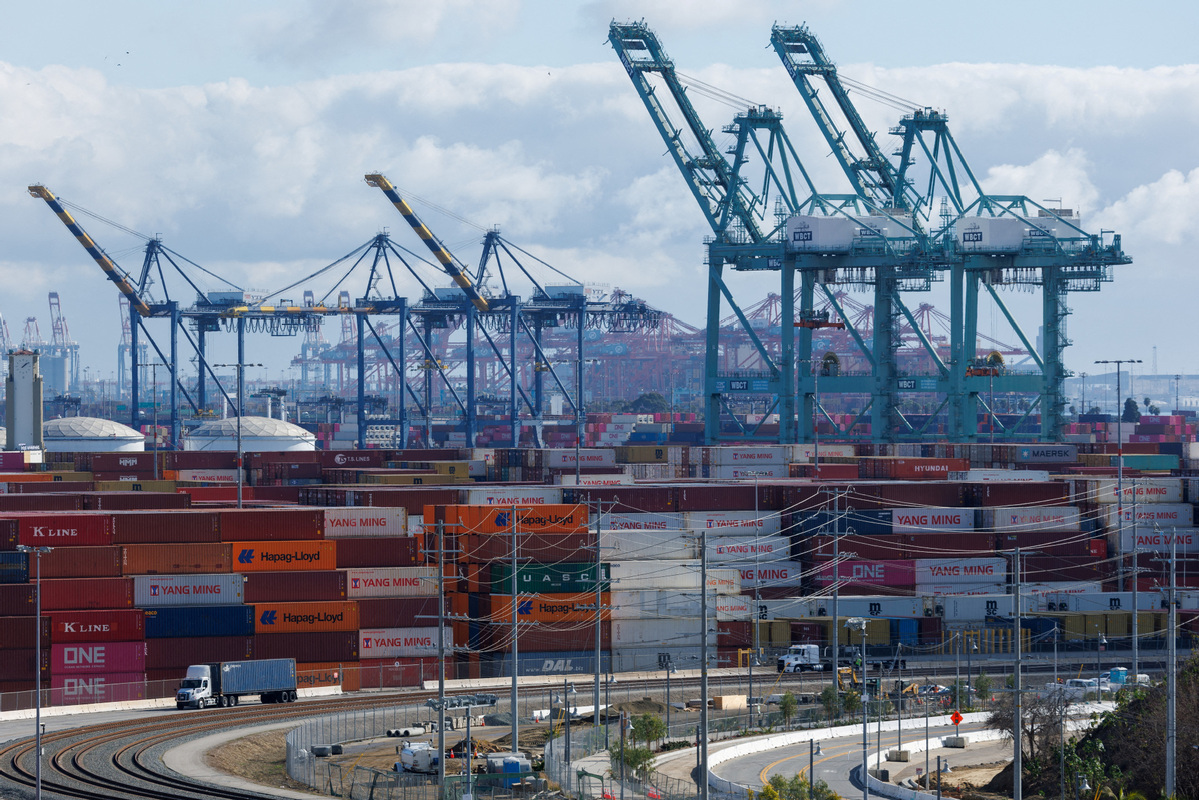- +86 028 86917961
- CHINESE
Head Office:
Vary City Plaza, Chenghua Dist., Chengdu ,China 610081
Warehouse:
Zone E, 77 International Logistics Park, Xindu District, Chengdu, China
E-mail:
info@unidalogistics.com
Hotline:
+86 028 86917961
Skype ID:UNIDA LOGISTICS

time : 2025-02-26 11:25:47 source : China Daily

A drone view shows shipping containers from China, at the China Shipping (North America) Holding Company Ltd. facility at the Port of Los Angeles in Wilmington, California, February 4, 2025. [Photo/Agencies]
The executive director of the Port of Los Angeles has expressed concern that imposing fees on Chinese shipping companies and vessels in that enter US ports — on the heels of new tariffs — could have economic repercussions.
A proposal announced Friday by the US Office of the Trade Representative would require the vessels to pay millions of dollars in new fees each time they dock at a US port, a cost that is likely to be passed down to American importers and exporters through higher freight rates.
Gene Seroka, executive director of the Port of Los Angeles, noted that the new fees and tariffs could create significant disruptions for businesses and workers who rely on international trade.
"We are hearing concerns from retailers, manufacturers, exporters, shippers, and consumers alike," he told China Daily. "Right now, there is a lot of confusion and uncertainty.
"While there is merit in fair, rules-based trade and strategic tariffs on specific items, widespread tariffs and counter-tariffs will adversely impact the American economy," he said.
US President Donald Trump, through an executive order, issued an additional 10 percent tariff on all imports from China, which took effect on Feb 4.
The executive director of the Port of Los Angeles has expressed concern that imposing fees on Chinese shipping companies and vessels in that enter US ports — on the heels of new tariffs — could have economic repercussions.
A proposal announced Friday by the US Office of the Trade Representative would require the vessels to pay millions of dollars in new fees each time they dock at a US port, a cost that is likely to be passed down to American importers and exporters through higher freight rates.
Gene Seroka, executive director of the Port of Los Angeles, noted that the new fees and tariffs could create significant disruptions for businesses and workers who rely on international trade.
"We are hearing concerns from retailers, manufacturers, exporters, shippers, and consumers alike," he told China Daily. "Right now, there is a lot of confusion and uncertainty.
"While there is merit in fair, rules-based trade and strategic tariffs on specific items, widespread tariffs and counter-tariffs will adversely impact the American economy," he said.
US President Donald Trump, through an executive order, issued an additional 10 percent tariff on all imports from China, which took effect on Feb 4.
He emphasized that post-industrial economies like the US face high manufacturing costs and inefficiencies, making large-scale domestic production difficult to sustain.
"Developed countries like the US are not suited for large-scale reindustrialization. The economic principles of international division of labor will eventually restore trade relations," Ye said.
Ye also noted that the Trump administration's tariffs initially disrupted US-China trade, causing supply chain shifts and raising import costs. However, he predicted that over time, economic pressures will push trade relations back to normal.
"As product prices rise and domestic reindustrialization efforts face challenges, trade will eventually return to a more balanced trajectory, aligning with the economic logic of international cooperation," he said.
Chinese businesses have been adapting since the initial wave of tariffs under the Trump administration, implementing strategies such as tax management, exchange rate adjustments, cost transfers and productivity improvements.
"I believe that after a brief period of difficulty, tariffs may actually become an external factor that stimulates further growth in China's manufacturing sector," Ye added.
Xie Jianhua, president of the US-China E-commerce Trade Association, emphasized the structural complementarity between China, home to seven of the world's top 10 ports, and the US, the largest consumer market.
"Decoupling and breaking links do not align with market rules," Xie told China Daily, citing the projected $690 billion bilateral trade volume in 2024.
Xie also stressed the need for US-China collaboration in emerging industries like green shipping and smart logistics.
China holds 62 percent of global electric ship-battery patents, and the US excels in marine electronic systems.
"Only cooperation can accelerate the industry's low-carbon transition," he said.


